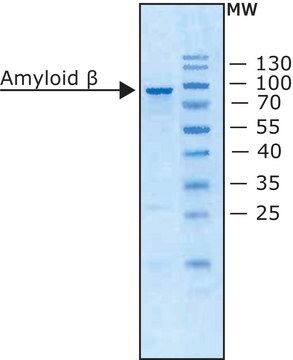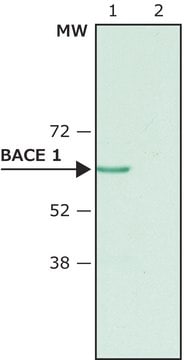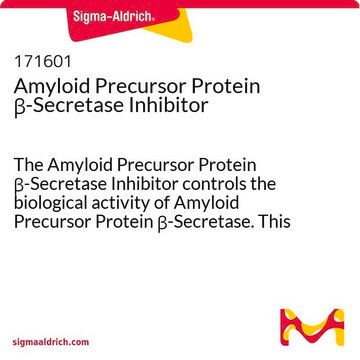S4195
β-Secretase human
recombinant, expressed in HEK 293 cells (C-terminal FLAG tagged), extracellular domain, ≥10,000 units/mg protein, ≥90% (SDS-PAGE), buffered aqueous solution
Synonym(s):
Asp-2, BACE1, Memapsin-2
About This Item
Recommended Products
recombinant
expressed in HEK 293 cells (C-terminal FLAG tagged)
Quality Level
Assay
≥90% (SDS-PAGE)
form
buffered aqueous solution
specific activity
≥10,000 units/mg protein
UniProt accession no.
shipped in
wet ice
storage temp.
2-8°C
Gene Information
human ... BACE1(23621)
Looking for similar products? Visit Product Comparison Guide
Application
Biochem/physiol Actions
Unit Definition
Physical form
Storage Class Code
12 - Non Combustible Liquids
WGK
nwg
Flash Point(F)
Not applicable
Flash Point(C)
Not applicable
Personal Protective Equipment
Certificates of Analysis (COA)
Search for Certificates of Analysis (COA) by entering the products Lot/Batch Number. Lot and Batch Numbers can be found on a product’s label following the words ‘Lot’ or ‘Batch’.
Already Own This Product?
Find documentation for the products that you have recently purchased in the Document Library.
Customers Also Viewed
Our team of scientists has experience in all areas of research including Life Science, Material Science, Chemical Synthesis, Chromatography, Analytical and many others.
Contact Technical Service

![MCA-[Asn670, Leu671]-Amyloid β/A4 Precursor Protein 770 Fragment 667-676-DNP-Lys-Arg-Arg-NH2 ≥90% (HPLC)](/deepweb/assets/sigmaaldrich/product/images/375/511/f63f11a7-86de-45c4-95a0-7afa616bb265/640/f63f11a7-86de-45c4-95a0-7afa616bb265.jpg)






![[Asn670, Leu671]-Amyloid β/A4 Precursor Protein 770 Fragment 667-676 trifluoroacetate salt ≥95% (HPLC), solid](/deepweb/assets/sigmaaldrich/product/images/296/089/259ad19e-25e1-4604-9077-8d4dbea518b6/640/259ad19e-25e1-4604-9077-8d4dbea518b6.jpg)

